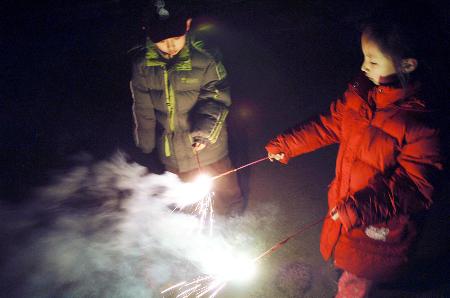Beijing re-embraces firecrackers
29/1/2006 10:47

The Chinese Lunar New Year's eve was misty in Beijing, but the national
capital did not lack shining decorations for the most ceremonious traditional
festival.
After 12 silent Spring Festivals, or the Chinese lunar new year
that falls on Sunday this year, Beijing regained a gorgeous festival eve which
was decorated with splendid fireworks and livened up with firecracker
clacks.
The Beijing municipal government lifted a 12-year ban on firecrackers
last December in a bid to add festivity to the lunar new year, which both
scholars and common people complained is losing its traditional color in the
modern era.
Beijing banned setting off fireworks in 1994 for fears of
increasing safety accidents, mainly fire alarms and human injuries, and also out
of concerns about air pollution.
But the ban triggered controversy from the
very beginning, as many argued it would lead to the loss of China's century-old
folk customs.
Burning firecrackers was believed to be an effective way to
dispel misfortune and evils in ancient times, and thus became a must for the
Chinese during major festivals and celebrations.
Beijing held a public
hearing last September on the lifting of the ban. The local legislature then
revised the law, permitting residents to set off fireworks during the Spring
Festival holiday season.
But the government took strict control on the sales
of firecrackers for safety concerns. Only authorized stores could sell the
products, which were obtained only after strict quality and safety check-up.
More than 2,000 stores got the license.
The municipal government organized
the sales of 600,000 boxes of firecrackers valued at more than 100 million yuan
(US$12.5 million) for its citizens.
"I saw fireworks only on TV before, but
tonight I set off them myself. They are as beautiful as shining stars! This is
the most unforgettable Spring Festival in my life," said Li Rong, a 12-year-old
girl whose parents worked in the Beijing-based Qinghua University.
Wu Ping, a
sophomore student at China University of Politics and Law, said he spent more
than 200 yuan (US$25) on firecrackers this Spring Festival.
"Firecrackers
only lived in my memory before, but tonight they came back to my life again.
When the ban was there, I often felt the Spring Festival was boring," said
Wu.
Safety accidents caused by firecrackers became a major concern in China
in the late 1980s, and 282 cities banned them successively in the 1990s. More
than 200 of those cities, however, had lifted the ban by the end of
2005.
"Setting off firecrackers, as part of the Chinese cultural heritage, is
not something that could be completely banned. I think it is important for the
people to enjoy the tradition that has been passed on for generations. As for
the safety problems, the key lies in the government's effective management,"
said Liu Tieliang, deputy chairman of China Folk Litterateur and Artists
Association.
All policemen in Beijing were on guard on Saturday evening to
watch over possible accidents, and more than 520,000 citizens were mobilized to
act as their assistants.
Tongren Hospital, the most famous ophthalmic
hospital in Beijing, offered round-the-clock service during the holidays. Most
human injuries cases involved the eyes.
Environmental authorities were also
monitoring air quality and were prepared to give warnings if any serious air
pollution was detected.
About 27,000 cleaners were on duty during the
holidays to clean wastepaper left on the streets by people setting off
firecrackers.
Xinhua news
|



